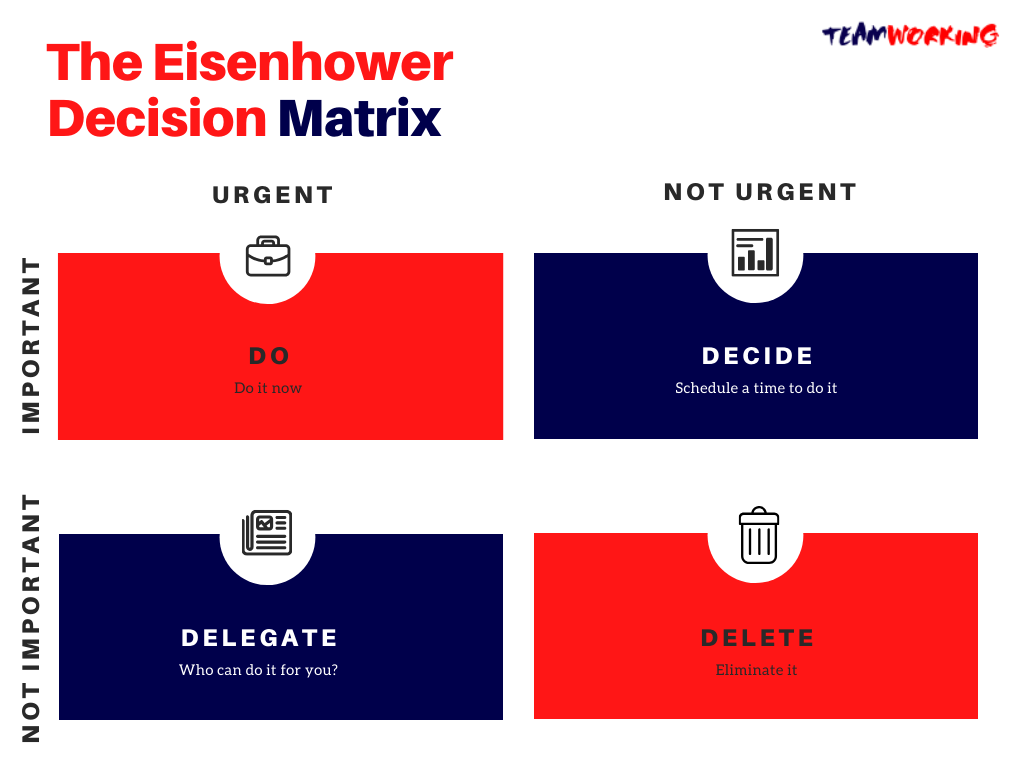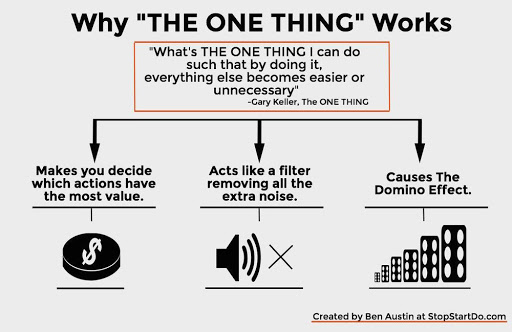Time can be a fundamental variable in our life as in our work. Our objectives also have deadlines and must be distinguished by priority. Through the Team Coaching process, with the Time Management session specifically, we will help you understand how to find and focus better on the main objectives.
Time and Goals
Often, having many goals can be wasteful and can lead to not being able to complete them. The solution we want to get you through our Team Coaching path is to focus on one goal at a time and devote all your energy to it. This will allow to reach the goal more easily and in less time.
The objectives differ in two main characteristics: urgency and importance. We know, of course, that for the same importance, we tend to resolve urgent matters first even if, in theory, it is always good to try to prevent emergency situations as they put us in a very high stress condition. In reality, therefore, what is important should be done precisely when we do not need it, without delay, in order to anticipate the future. This is possible only if we have in mind what the final goal of our project is.

Are we able to attribute the right value to our every commitment?
Dwight E. Eisenhower divided the problems into two types: urgent and important. He specifies that “the important thing is rarely urgent and what is urgent is rarely important.”
Several companies still use the urgency/importance matrix. It remains very useful for observing how we tend to spend our days. It does not help, however, in planning and focusing on the goal. Although all the interpreters of the matrix emphasize the importance of the “important but not urgent” quadrant, it is always up to us to know what to insert in this space.
Time management must be done with respect to objectives and priorities, considering a purpose to be achieved. The choice that must be made, therefore, is to focus on decisive activities.
The model we prefer: The One Thing
As for the objectives that are distinguished by importance, we know that there is always one that, somehow, once achieved, manages to make it easier to achieve other objectives of secondary importance. The first thing to do together with the team, therefore, is to understand what this main objective is, thanks to which everything else becomes secondary.
It is the goal that, in his book, Gary Klein calls The One Thing, or that thanks to which, once achieved, it makes our life undergo an important variation, making us take a quantum leap.
Above all, speaking of Smart Working and work from home, we know that Time Management becomes more and more complex. The timing is longer, there are more phone calls and video calls and fewer meetings in person, which are also those that allow for smoother communication.

The question that often arises is: will team members be productive in the same way from home too? To make sure that they are, when focusing their energies, priorities must be defined together with the team. In short, therefore, we must:
- Select important goals
- Create a scale of importance: The Pareto Principle, or also defined as “80-20”, starts from the assumption that once 20% of our objectives have been achieved, we have consequently also met 80% of our needs.
- Understand what our The One Thing is. That’s the goal that allows us to reach all the others and to bring all our energies on it.
This so called the “domino effect”, is the procedure whereby from a lesser objective it’s possible to achieve larger objectives.
Focused or multitasking?
We often pride ourselves on being multitasking, especially with Smart Working and remote working. It is certainly a good thing to be able to keep many commitments in mind, combine work and family, sports and home activities, time spent with friends and time devoted to your hobby. Having said that, however, this meaning of multitasking is very dangerous for work on objectives and also for time management.
In fact, it has been studied that a task performed without interruptions takes much less time than the same task carried out on several occasions, with other activities carried out in the meantime. This happens because, if distracted, our brain needs to re-think of what is required of it.
Furthermore, when we are overloaded with urgent thoughts and tasks, stress grows dramatically. That’s why time management goes hand in hand with stress and change management.
Is it useful to make a to-do list?
It’s certainly useful for completing the objectives, but working on a to-do list has nothing to do with time management. A to-do list is a means of remembering what there is to do and trying to delete it at the end of the day. So, as you can see it does not help to focus on the main objectives. The list of things to do gives an indication, in fact, only on what activities to carry out.
It is not that we have so little time but that we lose so much. The life we receive is not short but we make it so; we are not ill provided but use what we have wastefully.
(Seneca)
To understand the priority from which to start to manage time in the team effectively, however, it is possible to try starting from that thing that, once obtained, allows the group to achieve success in its activities.
An example that can help identify that main result may be to ask which customer, once conquered, will give the company a particular position. Or, also, which product, if developed earlier or better than its competitors, could give the company a competitive advantage.
Time Management: subdivision and sharing
Instead of a to-do list, what really can help us manage our time effectively is sharing and dividing energy, goals and priorities among all team members.
Sharing homework and decreasing efforts to achieve different goals is a good way to start managing time within the group. Each member has particular and specific qualities and abilities. These peculiarities may be more or less suitable for the different activities that will lead us to achieve the goal. It is therefore important to recognize these skills through the Assessment phase. Also, it is important to understand how they can be exploited in order to divide them according to the different objectives.
A well organized and thought out division of tasks will help the team to work better, thus obtaining satisfactory results in the shortest possible time.

